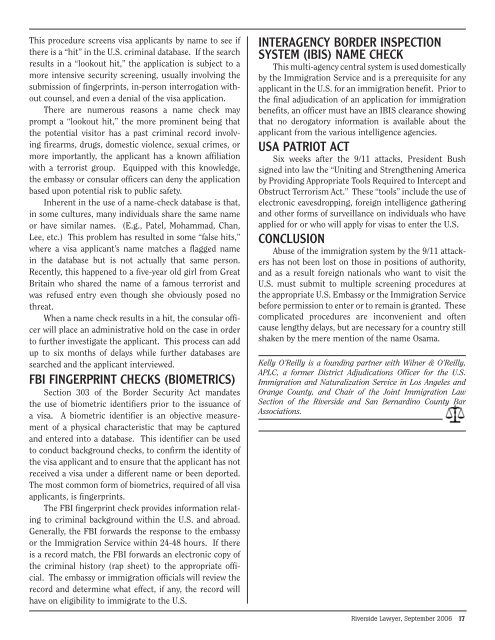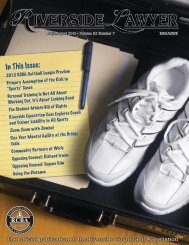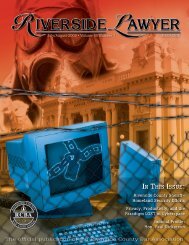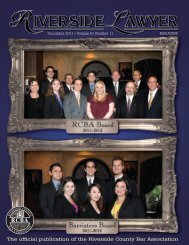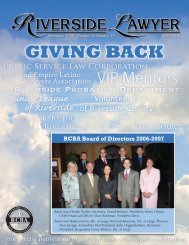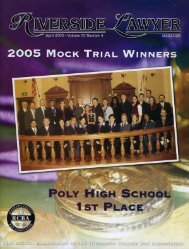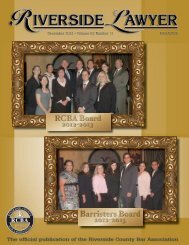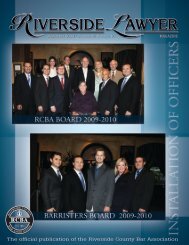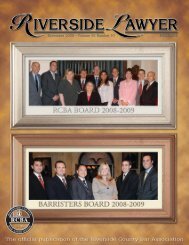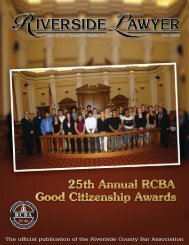THE JOHN GABBERT GALLERY - Riverside County Bar Association
THE JOHN GABBERT GALLERY - Riverside County Bar Association
THE JOHN GABBERT GALLERY - Riverside County Bar Association
You also want an ePaper? Increase the reach of your titles
YUMPU automatically turns print PDFs into web optimized ePapers that Google loves.
This procedure screens visa applicants by name to see if<br />
there is a “hit” in the U.S. criminal database. If the search<br />
results in a “lookout hit,” the application is subject to a<br />
more intensive security screening, usually involving the<br />
submission of fingerprints, in-person interrogation without<br />
counsel, and even a denial of the visa application.<br />
There are numerous reasons a name check may<br />
prompt a “lookout hit,” the more prominent being that<br />
the potential visitor has a past criminal record involving<br />
firearms, drugs, domestic violence, sexual crimes, or<br />
more importantly, the applicant has a known affiliation<br />
with a terrorist group. Equipped with this knowledge,<br />
the embassy or consular officers can deny the application<br />
based upon potential risk to public safety.<br />
Inherent in the use of a name-check database is that,<br />
in some cultures, many individuals share the same name<br />
or have similar names. (E.g., Patel, Mohammad, Chan,<br />
Lee, etc.) This problem has resulted in some “false hits,”<br />
where a visa applicant’s name matches a flagged name<br />
in the database but is not actually that same person.<br />
Recently, this happened to a five-year old girl from Great<br />
Britain who shared the name of a famous terrorist and<br />
was refused entry even though she obviously posed no<br />
threat.<br />
When a name check results in a hit, the consular officer<br />
will place an administrative hold on the case in order<br />
to further investigate the applicant. This process can add<br />
up to six months of delays while further databases are<br />
searched and the applicant interviewed.<br />
FBI FINGERPRINT CHECKS (BIOMETRICS)<br />
Section 303 of the Border Security Act mandates<br />
the use of biometric identifiers prior to the issuance of<br />
a visa. A biometric identifier is an objective measurement<br />
of a physical characteristic that may be captured<br />
and entered into a database. This identifier can be used<br />
to conduct background checks, to confirm the identity of<br />
the visa applicant and to ensure that the applicant has not<br />
received a visa under a different name or been deported.<br />
The most common form of biometrics, required of all visa<br />
applicants, is fingerprints.<br />
The FBI fingerprint check provides information relating<br />
to criminal background within the U.S. and abroad.<br />
Generally, the FBI forwards the response to the embassy<br />
or the Immigration Service within 24-48 hours. If there<br />
is a record match, the FBI forwards an electronic copy of<br />
the criminal history (rap sheet) to the appropriate official.<br />
The embassy or immigration officials will review the<br />
record and determine what effect, if any, the record will<br />
have on eligibility to immigrate to the U.S.<br />
INTERAGENCY BORDER INSPECTION<br />
SYSTEM (IBIS) NAME CHECK<br />
This multi-agency central system is used domestically<br />
by the Immigration Service and is a prerequisite for any<br />
applicant in the U.S. for an immigration benefit. Prior to<br />
the final adjudication of an application for immigration<br />
benefits, an officer must have an IBIS clearance showing<br />
that no derogatory information is available about the<br />
applicant from the various intelligence agencies.<br />
USA PATRIOT ACT<br />
Six weeks after the 9/11 attacks, President Bush<br />
signed into law the “Uniting and Strengthening America<br />
by Providing Appropriate Tools Required to Intercept and<br />
Obstruct Terrorism Act.” These “tools” include the use of<br />
electronic eavesdropping, foreign intelligence gathering<br />
and other forms of surveillance on individuals who have<br />
applied for or who will apply for visas to enter the U.S.<br />
CONCLUSION<br />
Abuse of the immigration system by the 9/11 attackers<br />
has not been lost on those in positions of authority,<br />
and as a result foreign nationals who want to visit the<br />
U.S. must submit to multiple screening procedures at<br />
the appropriate U.S. Embassy or the Immigration Service<br />
before permission to enter or to remain is granted. These<br />
complicated procedures are inconvenient and often<br />
cause lengthy delays, but are necessary for a country still<br />
shaken by the mere mention of the name Osama.<br />
Kelly O’Reilly is a founding partner with Wilner & O’Reilly,<br />
APLC, a former District Adjudications Officer for the U.S.<br />
Immigration and Naturalization Service in Los Angeles and<br />
Orange <strong>County</strong>, and Chair of the Joint Immigration Law<br />
Section of the <strong>Riverside</strong> and San Bernardino <strong>County</strong> <strong>Bar</strong><br />
<strong>Association</strong>s.<br />
<strong>Riverside</strong> Lawyer, September 2006 17


